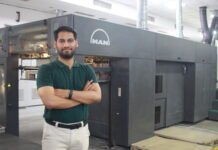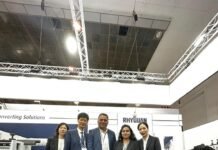At the Esko stand at IndiaCorr Expo 2017, Chris Miller, president, APAC, Esko, was busy interacting with customers. Packaging South Asia caught up with him to seek his views on the event and how he looked at the Indian market. “At this show we’re displaying both our digital finishing products—CAD design tool and Kongsberg X series digital finishing table—as well as our digital flexo plate maker,” said Miller, adding the company received excellent response at the event.
Sharing his views on the Indian market, Miller said, “We had our biggest year so far, last year; we grew by 50% and we are confident of repeating it this year too. From two people in Mumbai we now have seven people and we also have a new facility there. By the end of November we’ll have an open house at our new demo center in Mumbai. We also have our facility in Bengaluru and in Delhi we have gone up from one person to a team of three; we’ll continue to expand in Delhi.”
Miller also spoke of Esko’s product portfolio saying that the company has almost all the products in India that it sells globally. “The market here is transitioning like it has in other markets and with labor costs becoming more critical, the possibility of finding skilled people in such a niche industry is becoming difficult. Yet the difference between Esko and its competitors is that it has a larger and more fully operational setup in India with offices across different locations and personnel doing pre-sales, sales and after sales service and support,” Miller stated. He further asserted that Esko’s India team is self-sufficient with operations people, finance people, demo center and almost everything needed to run an independent profit center. “We’re not remotely managing it,” he added.
Miller feels that the packaging industry will have its ups and downs but over time it will continue to grow. Also, India, like many other countries, is saying ‘No’ to solvents and moving towards water-based solutions, flexo and other recycled material. He said, “We’ve been through that curve already in many other countries and we have the tools and technologies to help the packaging industry in India in this process. Automation can compliment a lot of the mundane tasks of workers and free them up for more creative jobs. This will eventually benefit the customer as more creative efforts will create better packaging. The idea is to get people into the thinking mode and let the computer do the routine tasks.”
The only challenge that Miller sees Esko facing is to ensure that the market absorbs its solutions well enough since there is so much on offer. “We have more solutions than most customers would ever want to try and take up at the outset. So our biggest strategy now is conducting workshops with customers and help them bit by bit on how to adopt the technology and become competitive in 6-9 months. When that becomes the new norm, we can help them solve their other problems. Over time, as our customer base grows, Esko also grows,” said Miller.











